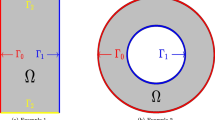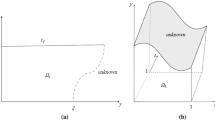Abstract
The paper presents a meshfree technique based on the method of fundamental solutions (MFS) and the energy equation associated with the model, to optimize the location of source points. Over the years, the simplest way of distributing the source set has been on a fixed contour lying outside of the considered domain. In this study, a method automates the optimal placement of the source points with the help of the energy conservation equation. The implementation of the scheme is carried forward for the inverse Cauchy problem of heat conduction, and numerical results are provided to establish the new scheme as a superior alternative to MFS.








Similar content being viewed by others
References
Lesnic D, Elliott L, Ingham DB (1997) An iterative boundary element method for solving numerically the Cauchy problem for the Laplace equation. Eng Anal Bound Elem 20(2):123–133
Mera NS, Elliott L, Ingham DB, Lesnic D (2000) An iterative boundary element method for the solution of a Cauchy steady state heat conduction problem. C Comput Model Eng Sci 1:101–106
Wang F, Chen W, Qu W, Gu Y (2016) A BEM formulation in conjunction with parametric equation approach for three-dimensional Cauchy problems of steady heat conduction. Eng Anal Bound Elements 63:1–14
Fu CL, Li HF, Qian Z, Xiong XT (2008) Fourier regularization method for solving a Cauchy problem for the Laplace equation. Inv Probl Sci Eng 16(2):159–169
Liu CS (2008) A modified collocation Trefftz method for the inverse Cauchy problem of Laplace equation. Eng Anal Bound Elem 32(9):778–785
Liu CS, Wang F, Gu Y (2018) Trefftz energy method for solving the Cauchy problem of the Laplace equation. Appl Math Lett 79:187–195
Lin J, Chen W, Wang F (2011) A new investigation into regularization techniques for the method of fundamental solutions. Math Comput Simul 81(6):1144–1152
Kupradze VD, Aleksidze MA (1964) The method of functional equations for the approximate solution of certain boundary value problems. USSR Comput Math Math Phys 4(4):82–126
Mathon R, Johnston RL (1977) The approximate solution of elliptic boundary-value problems by fundamental solutions. SIAM J Numer Anal 14(4):638–650
Fairweather G, Karageorghis A (1998) The method of fundamental solutions for elliptic boundary value problems. Adv Comput Math 9(1–2):69
Golberg MA, Chen CS, Fromme JA (1997) Discrete projection methods for integral equations. Appl Mech Rev 50:B75–B75
Chen CS, Cho HA, Golberg MA (2006) Some comments on the ill-conditioning of the method of fundamental solutions. Eng Anal Bound Elem 30(5):405–410
Tsai CC, Lin YC, Young DL, Atluri SN (2006) Investigations on the accuracy and condition number for the method of fundamental solutions. Comput Model Eng Sci 16(2):103
Alves CJS (2009) On the choice of source points in the method of fundamental solutions. Eng Anal Bound Elem 33(12):1348–1361
Wang F, Liu CS, Qu W (2018) Optimal sources in the mfs by minimizing a new merit function: energy gap functional. Appl Math Lett 86:229–235
Lin J, Lamichhane A, Chen CS, Lu J (2018) The adaptive algorithm for the selection of sources of the method of fundamental solutions. Eng Anal Bound Elements 95:154–159
Johnston RL, Fairweather G (1984) The method of fundamental solutions for problems in potential flow. Appl Math Model 8(4):265–270
Wang J, Ahmed MT, Lavers JD (1990) Nonlinear least squares optimization applied to the method of fundamental solutions for eddy current problems. IEEE Trans Magn 26(5):2385–2387
Katsurada M, Okamoto H (1996) The collocation points of the fundamental solution method for the potential problem. Comput Math Appl 31(1):123–137
Chen CS, Karageorghis A, Li Y (2016) On choosing the location of the sources in the MFS. Numer Algorithms 72(1):107–130
Liu CS (2012) An equilibrated method of fundamental solutions to choose the best source points for the Laplace equation. Eng Anal Bound Elem 36(8):1235–1245
Liu CS, Wang F (2018) An energy method of fundamental solutions for solving the inverse Cauchy problems of the Laplace equation. Comput Math with Appl 75(12):4405–4413
Author information
Authors and Affiliations
Corresponding author
Additional information
Publisher's Note
Springer Nature remains neutral with regard to jurisdictional claims in published maps and institutional affiliations.
Relevance of the work: The new scheme proves to be superior to MFS in terms of accuracy and speed. The simplicity of the work makes it easy to replicate and apply for other potential problems. Further, higher accuracy of the obtained results makes the novel scheme more reliable than others.
Rights and permissions
About this article
Cite this article
Arora, S., Dabas, J. Novel Meshfree Scheme For Solving The Inverse Cauchy problem Of Heat Conduction. Proc. Natl. Acad. Sci., India, Sect. A Phys. Sci. 92, 411–418 (2022). https://doi.org/10.1007/s40010-021-00729-w
Received:
Revised:
Accepted:
Published:
Issue Date:
DOI: https://doi.org/10.1007/s40010-021-00729-w




